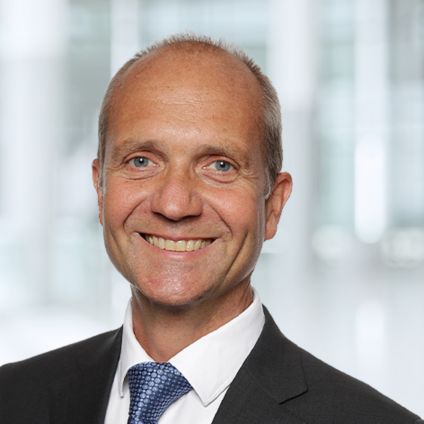Pessimism at a record high: International investors attest to Germany's dwindling strengths and declining attractiveness
KPMG survey of the 350 CFOs of the largest German subsidiaries of international groups
Survey of CFOs of the largest German subsidiaries of international groups
46% believe that other countries and regions are growing faster than Germany and intend to prioritise investments there in the next five years.
- All location factors are deteriorating with increasing momentum
- Biggest obstacles to investment: Excessive bureaucracy (61%), high energy costs (57%) and inadequate digitalisation (44%) lead the way, followed by ESG regulation (35%) and a lack of openness to technology (31%)
- Increasing scepticism towards Germany's political stability: only 58% still rank Germany among the five most stable EU countries (in 2021: 80%)
- Research landscape viewed more critically: Only 43% of respondents still rank Germany among the top 5 in the EU here (down 21 percentage points compared to 2017)
- Ambivalent outlook for the future: 52% of respondents see business opportunities in Germany's need for transformation, but only just under one in three (27%) actually want to invest
Berlin, 12 March 2024
The attractiveness of Germany as a business location is at risk. "We have lived on substance for too long and neglected important reforms. Almost one in two international CFOs (46%) currently rate other countries and regions as having stronger growth. They will prioritise new investments there in the next five years," says Andreas Glunz, Head of International Business at KPMG AG Wirtschaftsprüfungsgesellschaft at the presentation of the "Business Destination Germany 2024" study.
For this study, KPMG surveyed 350 CFOs of the largest German subsidiaries of international corporations from the most important investor countries. The study analysed the most important factors for Germany as a business location in an EU comparison.
After 2017, 2019 and 2021, the survey is now being conducted for the fourth time. This allows important trend statements to be made.
According to the survey, the world's third-largest economy is increasingly slipping into mid-table in an EU comparison. The KPMG location index, which takes 23 location factors into account, now only has a value of +1.2 on a scale of +10 (top of the EU comparison) to -10 (bottom of the EU comparison). This corresponds to a halving compared to the value from the 2021 study (+2.4). In 2017, the value was still +3.1.
Location factors deteriorate without exception
Germany's mentions as the frontrunner or top 5 EU country have also decreased massively for many individual location factors compared to the KPMG Location Index 2021: Political stability (-22 percentage points), labour productivity (-17 percentage points) and logistical/physical infrastructure (-16 percentage points).
In contrast to two years ago, foreign investors also rate those factors that have a particularly lasting impact on future viability and that have previously been among Germany's greatest strengths significantly lower: Research landscape (-13 percentage points) and Innovation-friendly environment (-8 percentage points).
Where does Germany perform worst? Degree of digitalisation of public administration (-4.1) and digital infrastructure (-2.0) as well as being affected by demographic change (-1.2)
One of the biggest obstacles to investment is the insufficient level of digitalisation in public administration (-4.1). Every fourth international CFO (25%) names Germany as the laggard. A further 36% place Germany among the five weakest countries in an EU comparison.
The digital infrastructure (-2.0) is rated similarly negatively. Only 11% of international investors in Germany still see it as one of the top 5 in the EU. In contrast, 9% rate it as the worst in the entire European Union.
Germany must no longer remain trapped in the analogue, paper-based world. In the face of high volatility and disruption, Germany must accelerate its digital transformation in order to become more competitive again.

Demographics are making the availability of skilled and highly qualified labour more difficult. Only just under one in four respondents (23%) still see Germany as one of the top 5 locations in Europe - a drop of 15 percentage points compared to the "Business Destination Germany 2022" study. In contrast, 21% of CFOs rank Germany among the last five EU countries. A further 8% even cite the location as the worst in Europe.
Andreas Glunz: "An influx of 500,000 qualified workers per year would be necessary to compensate for the shortage of skilled labour in Germany. But many of these immigrants fail to gain a foothold in the labour market or leave the country again quickly. Highly qualified workers are increasingly avoiding Germany. It would be important to have a modernised immigration policy or a migration strategy that is geared towards integration, productivity and demand."
Excessive bureaucracy and high energy costs as the biggest obstacles to investment
The scope and complexity of bureaucracy remain a major obstacle. 16% of international investors consider Germany to be at the bottom of the European league. A further 18% rate the location as one of the weakest five countries.
"Germany needs to massively reduce bureaucracy," says KPMG divisional director Glunz. "The business location has suffered from chronic overregulation for too long."
In addition to bureaucracy, foreign investors criticise the stalled energy transition. Energy-intensive industries in particular are burdened by high energy costs. 38% of the CFOs surveyed see Germany either at the bottom (15%) or among the bottom five EU countries (23%).
13% of those surveyed are therefore even considering relocating their production from Germany to other countries. Among the US companies surveyed, almost one in four (24%) are even considering this.
Foreign CFOs increasingly doubt political stability in Germany
While a large majority (80%) of respondents ranked Germany among the five most attractive countries in the EU in terms of political stability in 2021, this figure had fallen to 58% by the end of 2023.
13% now even see Germany as one of the weakest five nations. In 2021, this figure was just two per cent.
Criticism of a lack of openness to foreign investors and too little support and incentives for companies to settle here
International investors feel less welcome in Germany than they did two years ago. This is reflected in a significantly poorer assessment of openness to foreign investors (-16 percentage points), a reduced focus on their needs (-13 percentage points) as well as insufficient support and few incentives for company relocations and expansions (-10 percentage points).
"More than one in five international CFOs rank Germany among the weakest five countries (22%) in the EU in terms of its focus on the needs of international investors. In order to be successful globally, Germany needs to become significantly more attractive to international investors again," comments Andreas Glunz, Divisional Director.
"German companies are increasingly relocating their production abroad. International investors are also becoming increasingly critical of Germany's weaknesses. This development is alarming, as these companies generate around a fifth of Germany's gross value added. The future of the location is therefore at stake. A concerted package of measures is now needed to break this negative trend and return Germany to the top of the EU. I therefore fully endorse the demands of the "Industrial Deal" for a business case for Europe and Germany," says Andreas Glunz from KPMG.
52% of foreign investors see major business opportunities in Germany's transformation
On a positive note, more than one in two of the international CFOs surveyed (52%) recognise opportunities for their company in Germany's major transformation tasks and therefore want to invest here in the next five years. Only 7% want to reduce their presence in Germany, 37% want to increase it.
Andreas Glunz: "Germany is undergoing a transformation process of unprecedented proportions: this includes the energy transition, achieving climate neutrality, digitalisation, an ageing society, the country's ability to defend itself and a functioning infrastructure. Funding packages worth billions are available for the modernisation of the location. International corporations have recognised that this offers opportunities and are launching mega investment projects."
The core location factors of central logistical location, high standard of living and public safety continue to speak in favour of Germany - but are also declining
In an EU comparison, Germany remains in the upper midfield for the majority of location factors. The business location again receives the best ratings for the factors standard of living (72% rank Germany among the top 5 in the EU; -9 percentage points compared to 2021) and public safety (69%; -11 percentage points).
Germany's logistical location in the heart of Europe continues to be attractive for international companies. For 79% of the international CFOs surveyed, the Federal Republic is either the frontrunner (20%) or among the top five (59%).
More optimistic outlook for the 5-year perspective
The future expectations of the international CFOs surveyed for the current year 2024 are still cautious. Only more than a third (37%) expect their economic prospects to be "much better" (2%) or "better" (35%).
However, 59% of foreign investors expect the economic situation to be better or much better over the next five years.
About the "Business Destination Germany 2024" study
Methodology:
For the study, the opinion research institute Verian was commissioned by KPMG AG Wirtschaftsprüfungsgesellschaft in Germany to conduct a telephone survey of 350 CFOs of private German subsidiaries of foreign parent companies, whereby only the largest subsidiary per parent company was surveyed. At least 30 subsidiaries came from each of the seven largest investor countries in recent years: France, the UK, the Netherlands, Switzerland, Austria, China and Japan. For the largest investor country, the USA, 100 CFOs were surveyed. In addition, a total of 40 inbounds were surveyed from the following most important investor countries: Brazil, Denmark, Finland, Greece, India, Italy, Sweden, Spain and South Korea. The implementation period was between September and December 2023.
Press contact
Deputy Head Corporate Communications
KPMG AG Wirtschaftsprüfungsgesellschaft
T +49 89 9282 1722
creisbeck@kpmg.com

